The intersection of artificial intelligence and self-care is creating unprecedented opportunities for personal wellbeing. AI for self-care represents a technological revolution that’s making mental health support, spiritual practices, and personal development more accessible than ever before. From meditation apps that adapt to your emotional state to therapy chatbots available 24/7, these tools are reshaping how we nurture our minds and spirits in an increasingly digital world.
AI self-care applications are transforming how we approach wellbeing across multiple dimensions of life
AI in Spiritual Practices: Digital Paths to Mindfulness
Spiritual wellbeing has always been a deeply personal journey. Today, AI is creating new pathways to mindfulness, meditation, and spiritual exploration that adapt to individual needs while preserving the essence of these ancient practices.
AI-Powered Meditation Guides
Meditation apps have evolved beyond simple timers and pre-recorded sessions. Modern AI for self-care in the spiritual realm uses machine learning to understand your meditation patterns, stress levels, and preferences to create truly personalized experiences.
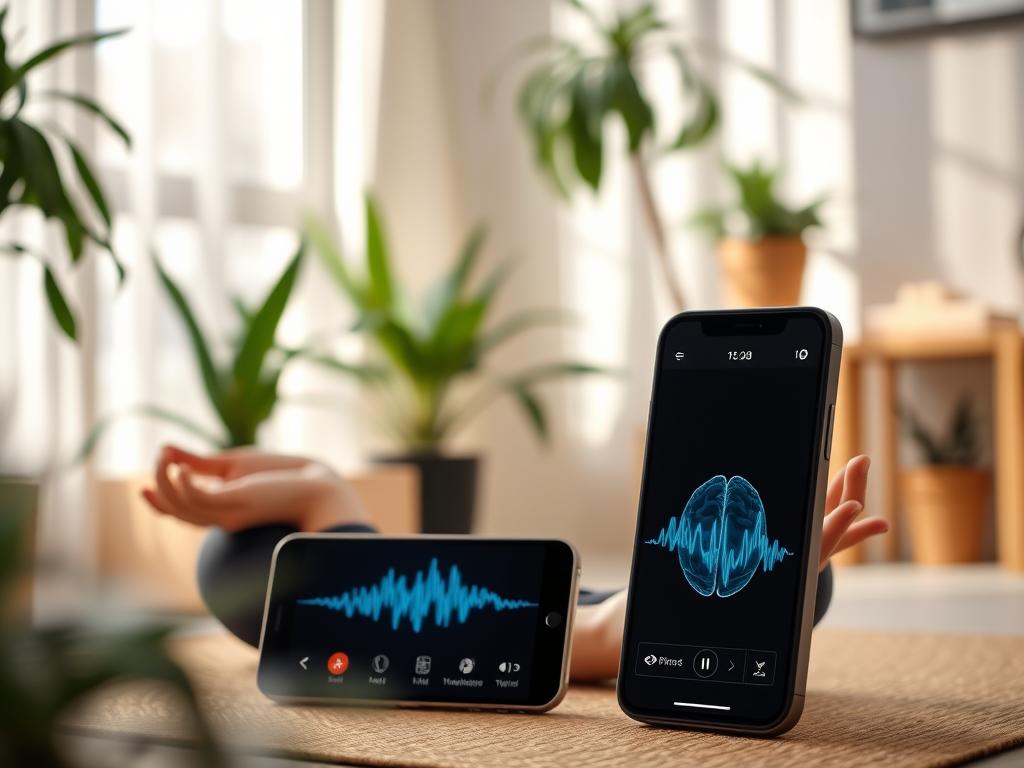
Apps like Headspace now incorporate AI to track your progress and adjust recommendations based on your meditation history. The app analyzes factors such as time of day you meditate, duration of sessions, and even detects patterns in when you’re most likely to skip practice. This data helps create a more effective meditation routine tailored specifically to your lifestyle.
Digital Spiritual Companions
AI spiritual advisors like Digital Deepak (based on Deepak Chopra’s teachings) offer guidance drawn from specific spiritual traditions. These AI companions can answer questions about life purpose, mindfulness practices, and spiritual growth using the wisdom of established teachers.
Unlike generic chatbots, these specialized AI tools are trained on specific philosophical and spiritual texts, allowing them to provide more nuanced and tradition-consistent guidance. They serve as accessible entry points for those curious about spiritual practices but uncertain where to begin.
Benefits of AI in Spiritual Practices
- Personalized guidance that evolves with your practice
- Accessibility for beginners without judgment
- Consistency through reminders and progress tracking
- Privacy for those exploring spirituality privately
- Adaptation to different spiritual traditions and preferences
Popular AI Spiritual Tools
- Headspace – AI-enhanced meditation guidance
- Calm – Personalized sleep and meditation content
- Digital Deepak – AI spiritual advisor based on Chopra’s teachings
- Aura – Emotion-tracking meditation recommendations
- Insight Timer – Community-based meditation with AI suggestions
Explore AI-Guided Meditation
Experience how AI can enhance your meditation practice with personalized guidance and insights.
AI in Mental Health Therapy: Support When You Need It
The mental health landscape is being transformed by AI technologies that provide accessible, affordable, and immediate support. While not replacing human therapists, these tools are filling crucial gaps in the mental healthcare system.

AI Therapy Chatbots: Conversations That Heal
AI-powered therapy chatbots like Wysa and Youper are designed using evidence-based approaches such as Cognitive Behavioral Therapy (CBT), Acceptance and Commitment Therapy (ACT), and Dialectical Behavior Therapy (DBT). These digital companions offer structured therapeutic conversations that help users process emotions, challenge negative thought patterns, and develop healthier coping mechanisms.
What makes these AI tools particularly valuable is their 24/7 availability. Unlike human therapists with limited office hours, AI companions can provide support during late-night anxiety attacks, weekend stress episodes, or whenever emotional challenges arise.
Emotion Recognition and Tracking
Advanced AI for self-care now includes emotion recognition capabilities that analyze text, voice patterns, and even facial expressions to identify emotional states. Apps like Youper and Neurofit use this technology to help users gain awareness of their emotional patterns over time.
By tracking emotional data, these tools can identify triggers and patterns that might otherwise go unnoticed. For example, they might detect that you consistently experience anxiety on Sunday evenings or that certain social interactions correlate with mood changes.
| AI Therapy App | Key Features | Therapeutic Approach | Best For |
| Wysa | AI chatbot with optional human therapist access | CBT, Mindfulness | Anxiety, stress management |
| Youper | Personalized therapy with mood tracking | CBT, ACT, DBT | Self-reflection, emotional awareness |
| Woebot | Structured daily check-ins | CBT, Interpersonal Therapy | Depression, anxiety |
| Sonia | Voice & text anxiety support | CBT, Exposure Therapy | Anxiety management |
Ethical Considerations in AI Therapy
Benefits
- Increased accessibility to mental health support
- Reduced cost compared to traditional therapy
- 24/7 availability for immediate support
- Reduced stigma for those uncomfortable with human therapists
- Consistent application of evidence-based techniques
Limitations
- Cannot replace human therapists for complex issues
- Privacy concerns regarding sensitive mental health data
- Limited ability to detect crisis situations
- Potential for algorithmic bias in responses
- Lack of human empathy and nuanced understanding
Experience AI Therapy Support
Try an AI therapy companion that uses evidence-based approaches to support your mental wellbeing.
AI for Personal Growth: Your Digital Development Partner
Beyond spiritual practices and therapy, AI is revolutionizing how we approach personal development. From habit formation to skill acquisition, AI tools are becoming sophisticated partners in our growth journeys.

AI-Powered Habit Formation
Apps like Fabulous use behavioral science and AI to help users build lasting habits. Unlike traditional habit trackers, AI-enhanced tools adapt to your behavior patterns, learning when you’re most likely to complete habits successfully and when you need additional motivation.
These systems analyze factors such as your completion rates, time patterns, and even correlations between different habits to create a personalized approach to behavior change. For example, the AI might notice you’re more likely to meditate after exercise and adjust your schedule recommendations accordingly.
AI Life Coaches and Mentors
Digital life coaches powered by AI offer personalized guidance for various aspects of personal development. These tools combine goal-setting frameworks with adaptive learning to provide increasingly relevant advice as they learn about your specific challenges and preferences.
Unlike static self-help content, AI coaches can engage in dialogue about your specific situation, helping you work through obstacles and develop tailored strategies. They can also provide accountability through check-ins and progress tracking that adapts to your pace of growth.
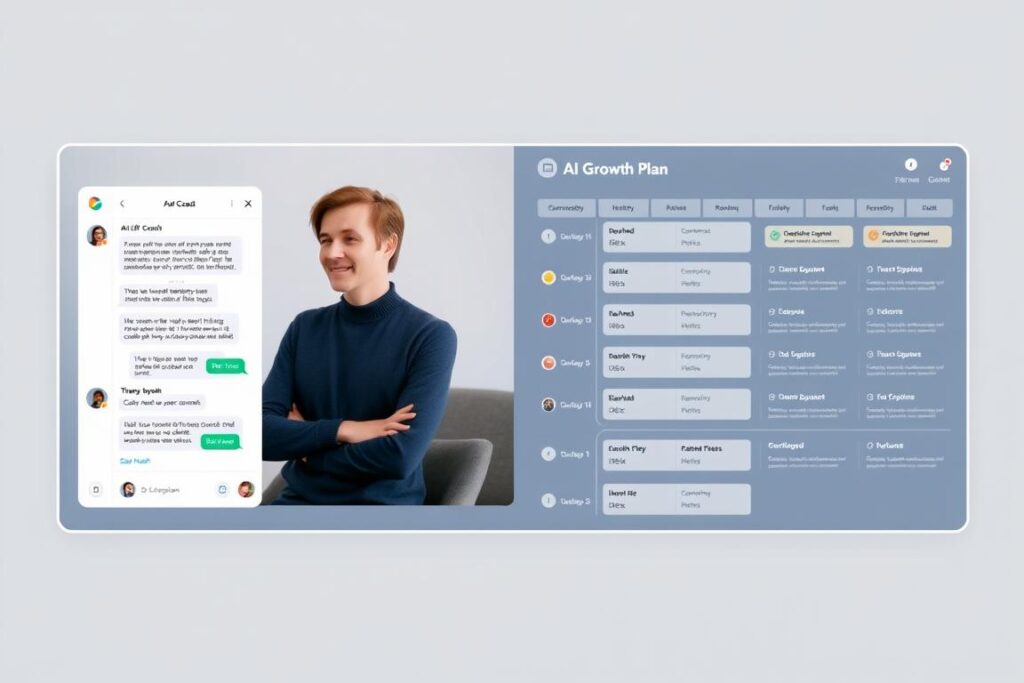
Personalized Learning Experiences
AI is transforming educational experiences by creating truly adaptive learning paths. Platforms like Duolingo for language learning and Khan Academy for academic subjects use AI to identify knowledge gaps and learning patterns, then adjust content difficulty and presentation accordingly.
These systems go beyond simple right/wrong assessments to understand the nature of your mistakes and customize explanations based on your learning style. The result is a more efficient and engaging learning experience tailored to your unique needs.
Transform Your Habits with AI
Discover how AI-powered habit formation can help you build consistent routines and achieve your personal goals.
Case Studies: AI for Self-Care Success Stories
To understand the real-world impact of AI self-care tools, let’s examine some notable success stories that demonstrate their effectiveness across different domains.

Case Study 1: Wysa for Anxiety Management
Sarah, a 34-year-old marketing professional, struggled with generalized anxiety disorder but had limited access to therapy due to her remote location and busy schedule. After using Wysa for three months, she reported a 47% reduction in anxiety symptoms.
The AI chatbot helped Sarah identify thought patterns triggering her anxiety and provided CBT techniques she could apply in real-time. The app’s 24/7 availability meant she could get support during panic attacks, regardless of the time.
Most importantly, the data collected helped Sarah’s occasional sessions with a human therapist become more productive, as they could focus on deeper issues rather than basic coping strategies.
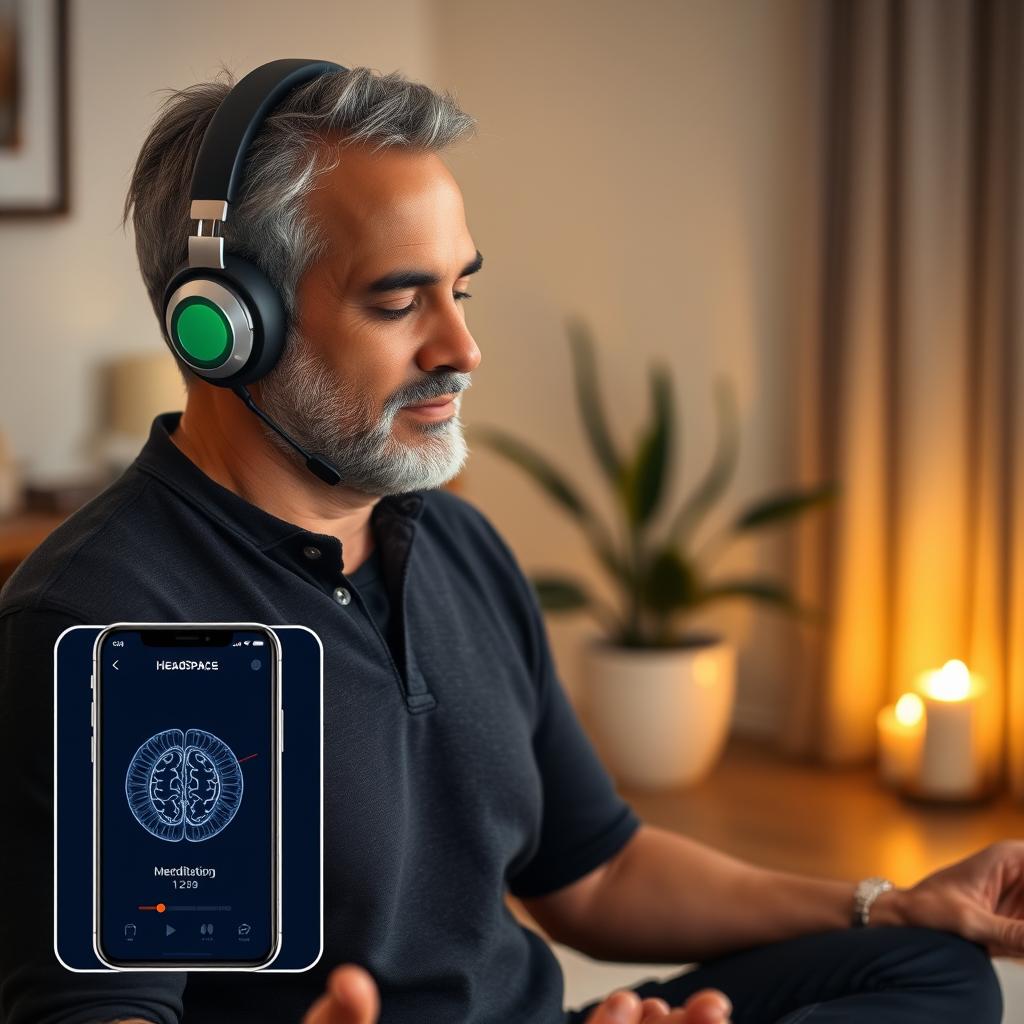
Case Study 2: Headspace for Stress Reduction
Michael, a 42-year-old software developer with chronic stress, tried Headspace’s AI-enhanced meditation program. The app analyzed his sleep patterns, stress levels, and meditation consistency to create a personalized program.
After six weeks, Michael’s heart rate variability (a measure of stress resilience) improved by 23%. The AI identified that 10-minute morning meditations were most effective for him, rather than the longer evening sessions he had initially preferred.
The personalized nature of the recommendations kept Michael engaged with the practice, resulting in a 92% adherence rate compared to his previous attempts at meditation that typically lasted only a week or two.

Case Study 3: Duolingo for Personalized Learning
Elena, a 28-year-old graduate student, used Duolingo’s AI-powered language learning platform to learn Japanese. Unlike traditional language courses, the AI adapted to her specific challenges with character recognition.
The system identified patterns in her mistakes and created specialized exercises targeting her weak areas. It also adjusted the review schedule based on her forgetting curve, ensuring optimal retention.
Within four months, Elena achieved conversational proficiency that typically takes students 8-10 months with traditional methods. The personalized approach maintained her motivation with a 96% daily practice rate.
“The most impressive aspect of AI self-care tools isn’t just their effectiveness, but their ability to meet people where they are—providing support that adapts to individual needs, schedules, and learning styles.”
Share Your AI Self-Care Story
Have you had success using AI for your wellbeing journey? Join our community and share your experience.
Ethical Considerations in AI for Self-Care
While AI self-care tools offer tremendous benefits, they also raise important ethical questions that users and developers must carefully consider.
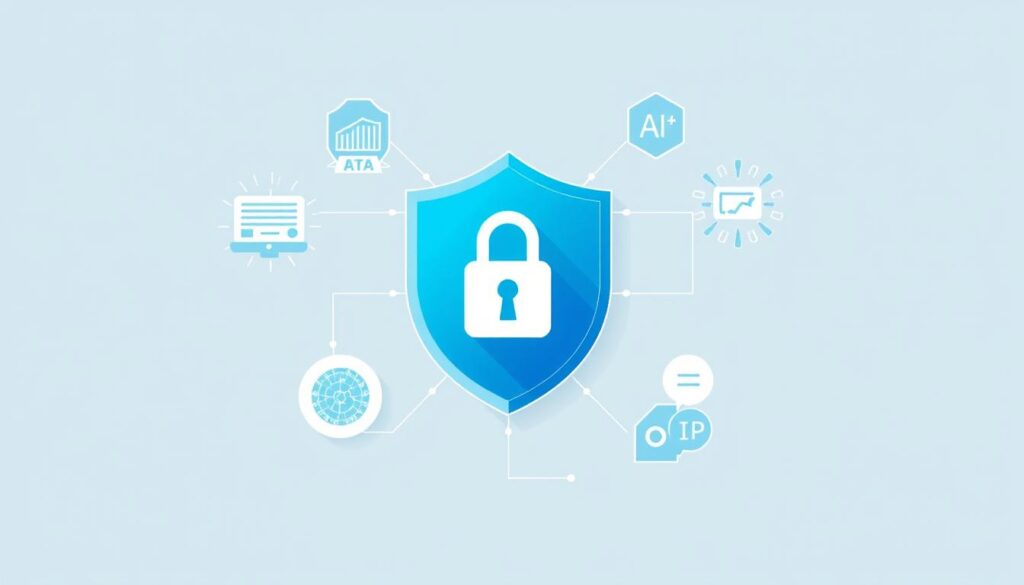
Privacy and Data Security
AI self-care applications collect highly sensitive personal data, including emotional states, behavioral patterns, and sometimes even voice recordings or text conversations about deeply personal issues. This raises significant privacy concerns:
Key Privacy Questions to Ask Before Using AI Self-Care Tools:
- Is your data encrypted end-to-end?
- How long is your personal information retained?
- Is your data shared with third parties?
- Can you request complete deletion of your data?
- Does the app comply with healthcare privacy regulations?
The best AI self-care tools implement strong encryption, clear data policies, and give users control over their information. Before using any AI wellness application, carefully review its privacy policy and terms of service.
The Risk of Over-Reliance
As AI self-care tools become more sophisticated and personalized, there’s a risk of users developing dependency on digital support rather than building internal resources and human connections.
While AI can provide valuable support, it’s important to view these tools as supplements to, rather than replacements for, human connection and professional care when needed. The most ethical AI applications clearly communicate their limitations and encourage appropriate professional help for serious issues.

The “Human Touch” Debate
Perhaps the most fundamental question surrounding AI for self-care is whether technology can truly provide the empathy, understanding, and connection that humans need for emotional wellbeing.
Research suggests that while AI can simulate empathy and provide consistent support, most users still recognize the difference between algorithmic responses and genuine human connection. The most successful applications acknowledge this limitation and position themselves as complementary to, rather than replacements for, human relationships.
Can AI truly understand human emotions?
Current AI systems don’t “understand” emotions in the way humans do. They recognize patterns in data that correlate with emotional states and respond according to their programming. While they can accurately identify emotional cues and provide appropriate responses, they lack the subjective experience of emotions that humans have.
That said, many users report meaningful connections with AI companions, suggesting that perfect understanding may not be necessary for beneficial support. The perception of being understood can itself be therapeutic, even when coming from an algorithm.
How can I ensure my data is protected when using AI self-care tools?
Look for applications that clearly state they use end-to-end encryption and have transparent privacy policies. Prefer tools that are compliant with healthcare regulations like HIPAA (in the US) or GDPR (in Europe). Consider using apps that allow local processing of data rather than cloud storage when possible.
Be particularly cautious with free applications, as they may be more likely to monetize your data. Always read privacy policies before sharing sensitive information, and periodically review which applications have access to your personal data.
Important Reminder
AI self-care tools are not substitutes for professional help in crisis situations. If you’re experiencing severe mental health symptoms or having thoughts of self-harm, please contact a mental health professional or crisis hotline immediately.
The Future of AI for Self-Care
As we look ahead, several emerging trends are likely to shape the evolution of AI in self-care practices.
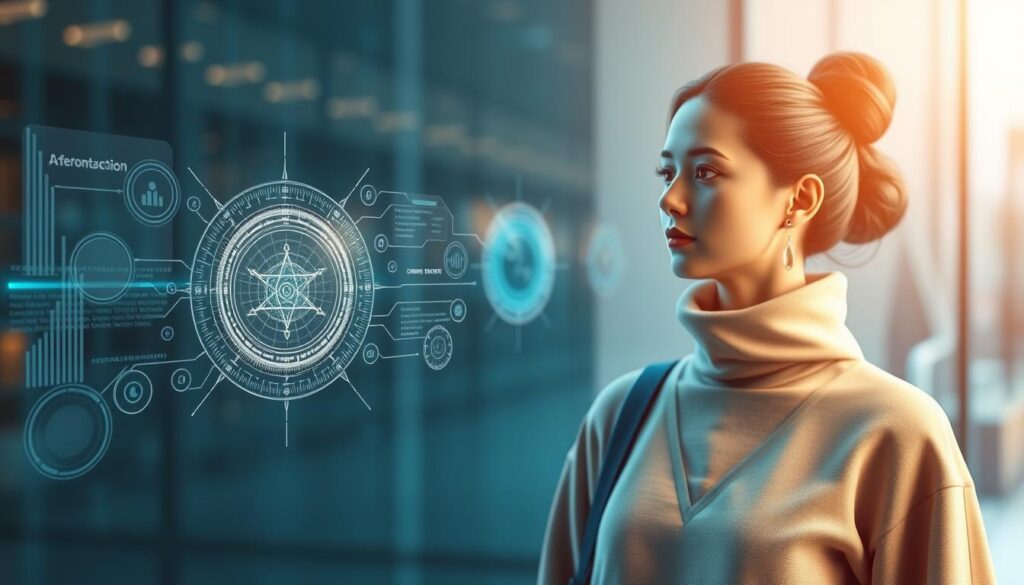
Multimodal AI Integration
Future AI self-care systems will likely integrate multiple data sources—wearable devices, smart home sensors, voice analysis, and digital behavior patterns—to create a more comprehensive understanding of wellbeing. This holistic approach will enable more precise and effective interventions.
Imagine an AI system that notices changes in your voice patterns indicating stress, correlates this with reduced sleep quality from your smart mattress data, and suggests specific interventions tailored to your historical preferences and current state.
Hybrid Human-AI Care Models
Rather than replacing human support, the most promising future direction appears to be hybrid models where AI handles routine support, data collection, and pattern recognition, while human professionals focus on complex issues, relationship-building, and critical decision-making.
These collaborative approaches leverage the strengths of both AI (consistency, availability, data processing) and humans (empathy, intuition, ethical judgment) to create more effective and ethical care systems.
Increased Personalization Through Federated Learning
Advances in privacy-preserving AI techniques like federated learning will allow for highly personalized self-care without compromising data security. These approaches enable AI models to learn from user data without that data ever leaving the user’s device.
This technological shift will help address one of the core tensions in AI for self-care: the trade-off between personalization (which requires data) and privacy (which restricts data sharing).
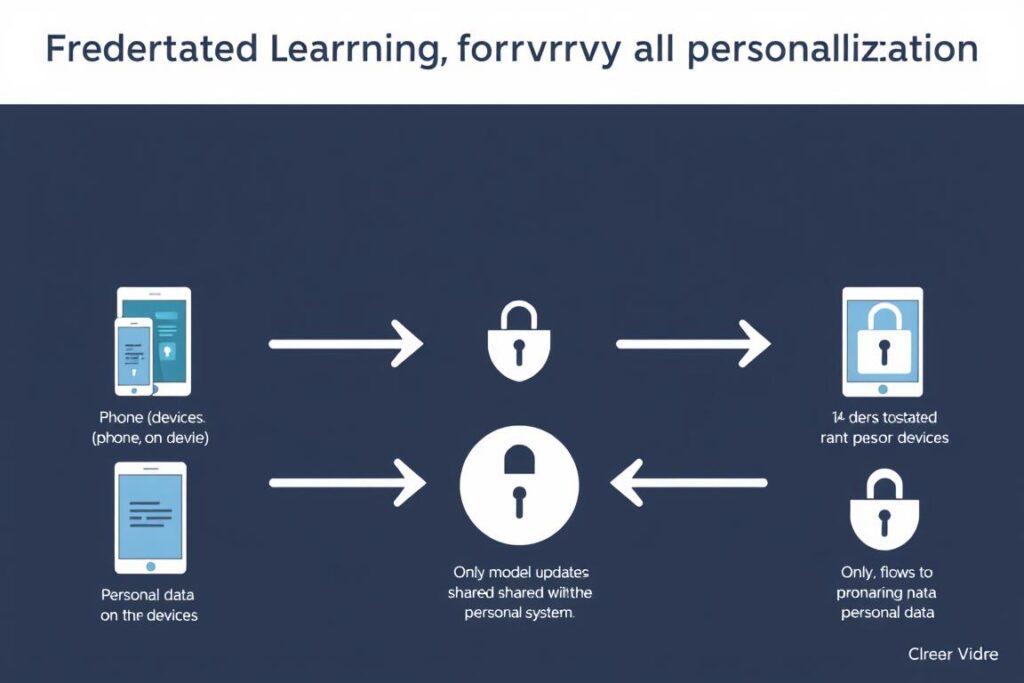
Spotlight: Innovative AI Self-Care Applications
Let’s explore some cutting-edge applications that demonstrate the potential of AI for self-care across different domains.
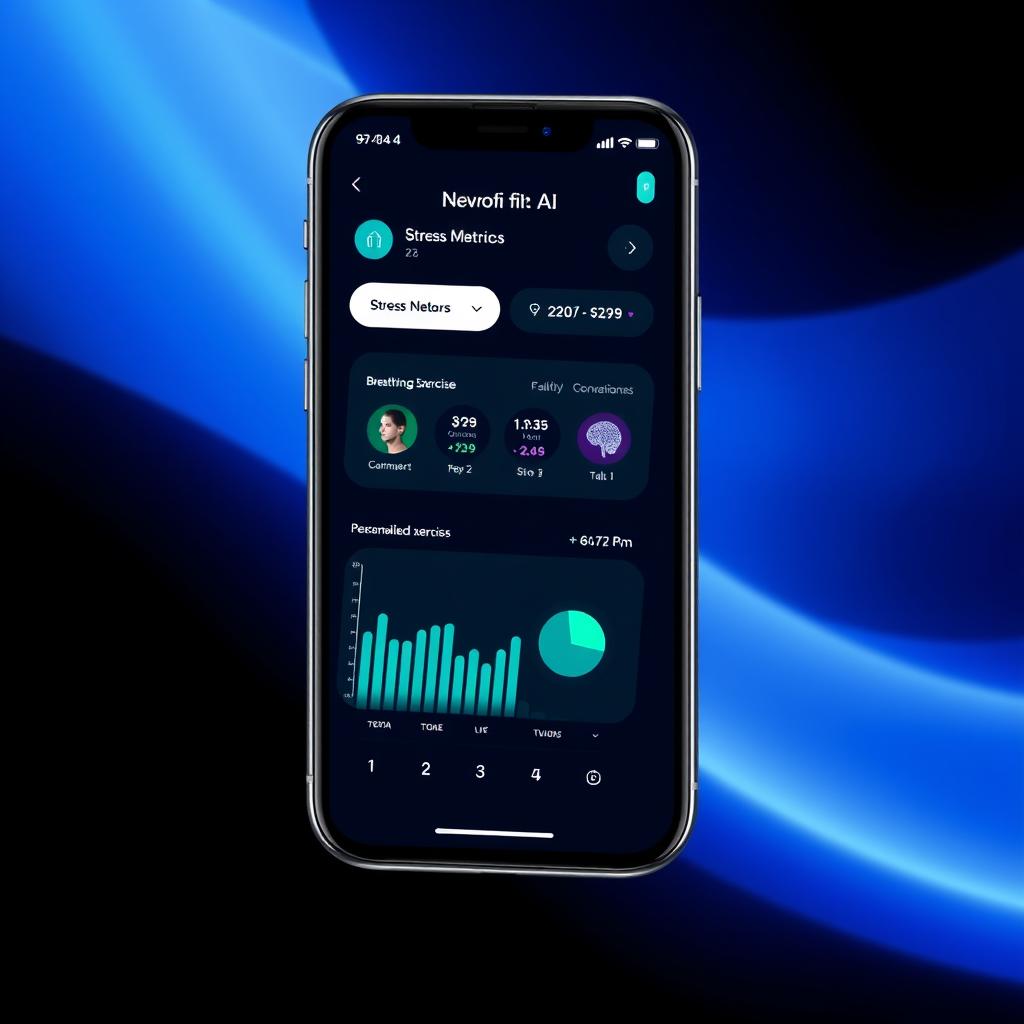
Neurofit: AI Trainer for Your Nervous System
Neurofit represents a new category of AI self-care focused specifically on nervous system regulation. Using data from wearables and user input, it creates personalized protocols to help users develop greater resilience to stress.
The app’s AI analyzes biometric data to identify patterns in your stress response and recommends specific movement exercises, breathing techniques, and recovery protocols tailored to your nervous system’s unique patterns.
Users report a 54% average decrease in stress after just one week, demonstrating the potential of targeted, data-driven approaches to physiological self-regulation.
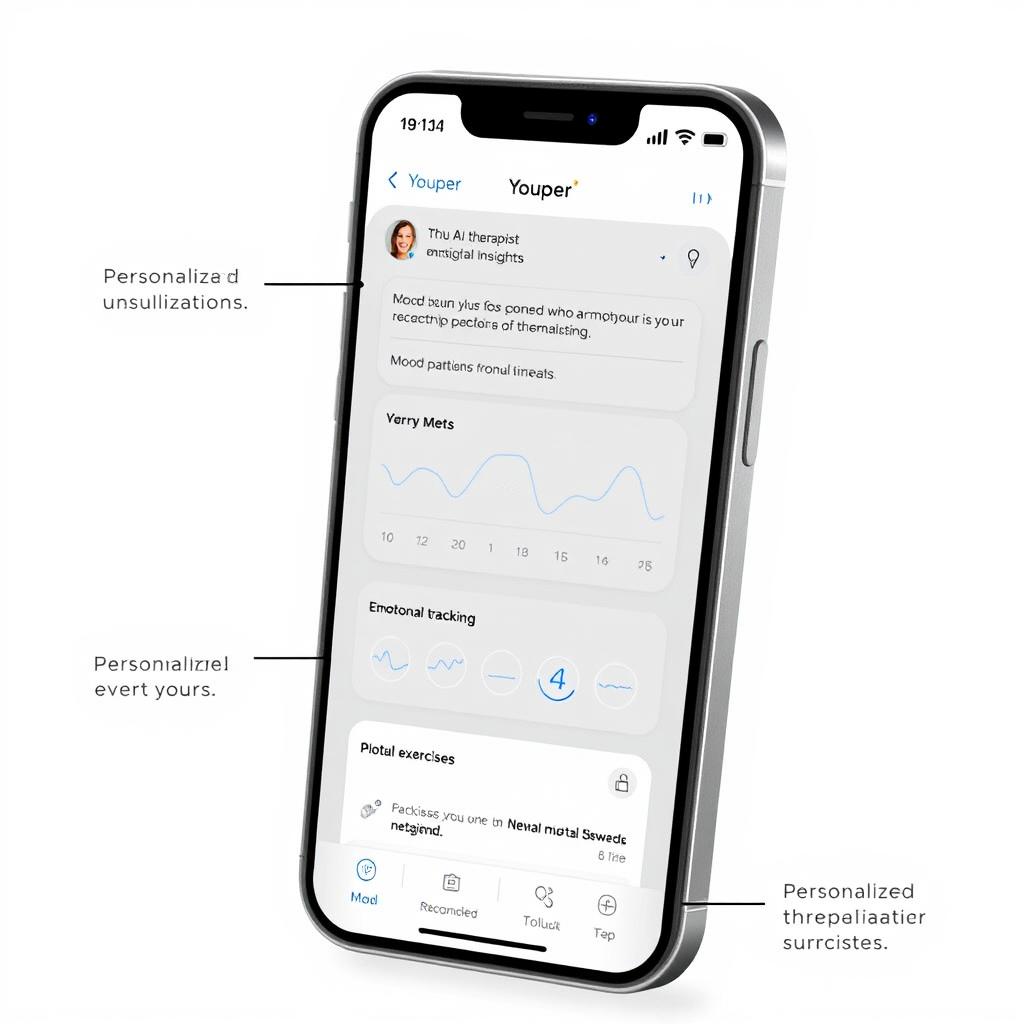
Youper: Personalized AI Therapy
Youper combines multiple therapeutic approaches (CBT, ACT, and DBT) with an AI system that learns from your responses to create increasingly personalized interventions.
What sets Youper apart is its focus on emotional pattern recognition. The AI identifies connections between situations, thoughts, and emotional responses that might not be obvious to the user, providing insights that can lead to breakthrough moments of self-awareness.
A Stanford study found that 80% of users reported improved wellbeing after using the app, with particularly strong results for those dealing with anxiety and mild to moderate depression.
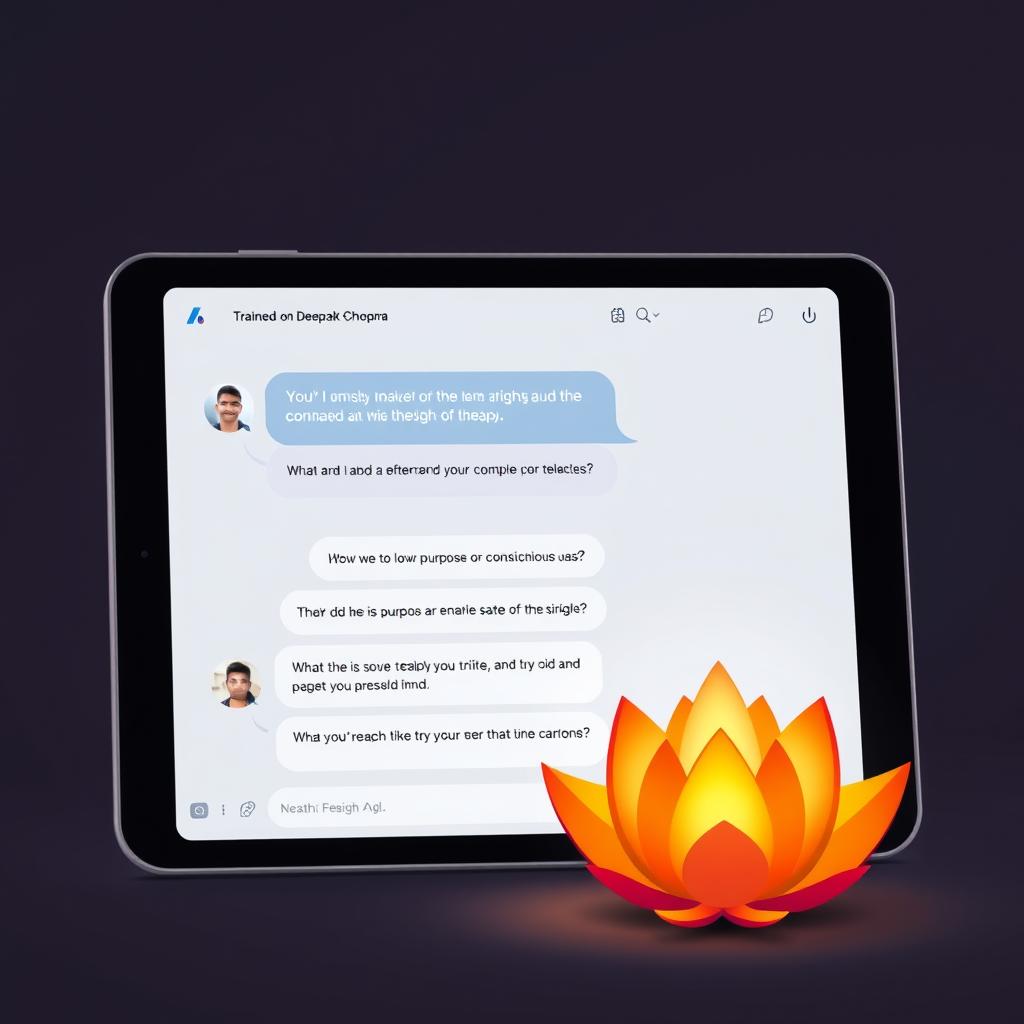
Digital Deepak: AI Spiritual Wisdom
Digital Deepak represents a specialized approach to AI spiritual guidance, trained exclusively on the teachings of Deepak Chopra rather than general internet data.
This focused training creates a more coherent philosophical perspective compared to general-purpose AI chatbots. Users can explore spiritual concepts, meditation techniques, and consciousness with an AI that maintains consistent philosophical integrity.
The pay-as-you-go model ($0.50 for 30 minutes) makes spiritual guidance more accessible while reducing the commitment barrier that might prevent people from exploring these concepts.
Discover Specialized AI Self-Care
Explore these innovative applications that are pushing the boundaries of what AI can offer for personal wellbeing.
Implementing AI for Self-Care: A Balanced Approach
With so many AI self-care options available, how can you integrate these tools effectively into your wellbeing routine? Here’s a framework for thoughtful implementation.

Assess Your Self-Care Needs
Begin by identifying the specific areas where you need support. Are you looking for help with meditation consistency? Emotional regulation? Habit formation? Spiritual exploration? Different AI tools excel in different domains, so clarity about your needs will guide better choices.
Consider both your immediate concerns and longer-term growth aspirations. The most effective self-care approach often addresses both current challenges and future development.
Start Small and Evaluate
Rather than adopting multiple AI tools simultaneously, start with one application that addresses your primary need. Use it consistently for at least 2-3 weeks before evaluating its impact on your wellbeing.
Pay attention to both objective metrics (like consistency, sleep quality, or mood scores) and subjective experience (how you feel about using the tool and whether it integrates smoothly into your life).
Maintain Human Connection
The most effective approach to AI for self-care views these tools as supplements to, rather than replacements for, human connection. Research consistently shows that meaningful human relationships remain essential for psychological wellbeing.
Consider how AI tools can enhance rather than substitute for human interaction. For example, an AI meditation app might help you establish a consistent practice that makes you more present in your relationships, or an emotion-tracking tool might help you communicate more effectively with loved ones.
Creating Your AI Self-Care Ecosystem
The most effective approach combines different types of AI support to address various aspects of wellbeing:
- Foundation: Daily practice app (meditation, journaling, or habit tracking)
- Support: Emotional companion for challenging moments
- Growth: Learning or coaching app for developing new skills
- Human Component: Regular check-ins with friends, family, or professionals
Set Boundaries
Establish clear boundaries for your AI self-care tools. Decide when and how you’ll engage with them, and be mindful of potential dependency. Some users find it helpful to designate tech-free periods or spaces to ensure they’re maintaining balance.
Remember that the ultimate goal of self-care tools should be greater autonomy and wellbeing, not increased reliance on external systems—even intelligent ones.
Conclusion: The Future of AI for Self-Care
AI for self-care represents a significant evolution in how we approach personal wellbeing. From spiritual practices to therapy to personal growth, these technologies are making support more accessible, personalized, and effective than ever before.
The most promising developments combine the strengths of AI—consistency, availability, data processing, and personalization—with the irreplaceable elements of human connection, including empathy, intuition, and shared experience. As these technologies continue to evolve, maintaining this balance will be essential.
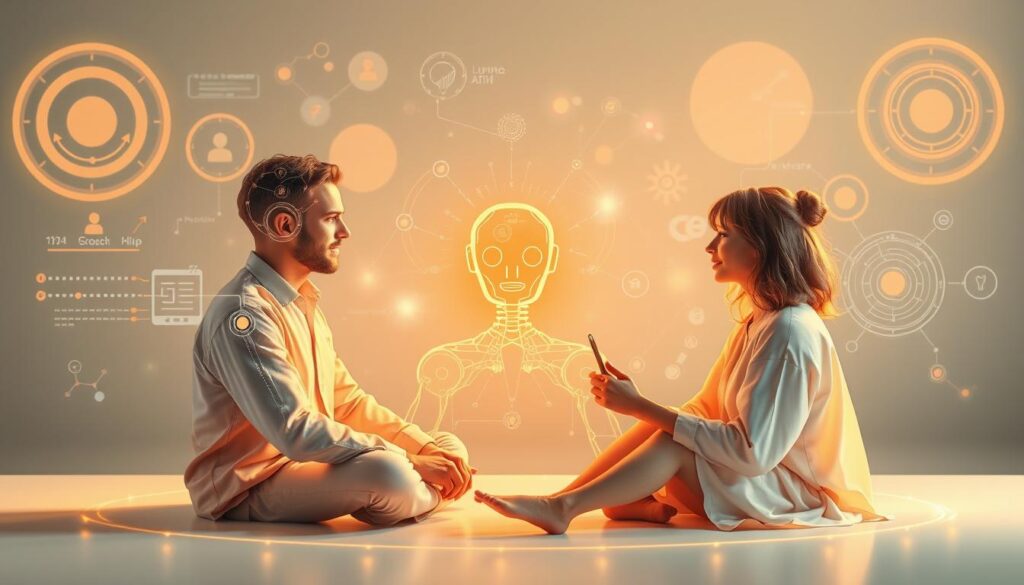
For those exploring AI for self-care, approach these tools with both openness and discernment. Be willing to experiment with new approaches that might enhance your wellbeing, while maintaining a critical awareness of their limitations and ethical implications.
Ultimately, the most effective self-care approach is one that empowers you with greater awareness, resilience, and capacity for growth—regardless of whether that support comes from advanced algorithms, human connections, or most likely, a thoughtful combination of both.
Share Your AI Self-Care Experience
Have you used AI tools for your wellbeing journey? We’d love to hear about your experience and what you’ve learned.







